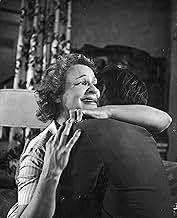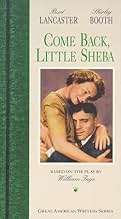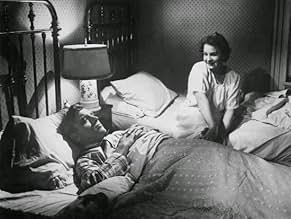IMDb RATING
7.5/10
5.5K
YOUR RATING
An emotionally remote recovering alcoholic and his dowdy, unambitious wife face a personal crisis when they take in an attractive lodger.An emotionally remote recovering alcoholic and his dowdy, unambitious wife face a personal crisis when they take in an attractive lodger.An emotionally remote recovering alcoholic and his dowdy, unambitious wife face a personal crisis when they take in an attractive lodger.
- Won 1 Oscar
- 7 wins & 8 nominations total
Robert Fuller
- Extra
- (uncredited)
Ned Glass
- Man at AA Meeting
- (uncredited)
William Haade
- Hospital Intern
- (uncredited)
Virginia Hall
- Blonde in Diner
- (uncredited)
Anthony Jochim
- Mr. Cruthers
- (uncredited)
Peter Leeds
- Milkman
- (uncredited)
Kitty McHugh
- Pearl Stinson - AA Member
- (uncredited)
Paul McVey
- Postman
- (uncredited)
Beverly Mook
- Judy Coffman
- (uncredited)
Virginia Mullen
- Henrietta Colby - AA Member
- (uncredited)
- Director
- Writers
- All cast & crew
- Production, box office & more at IMDbPro
Storyline
Did you know
- TriviaShirley Booth's movie debut.
- GoofsWhen Doc takes the bottle from the kitchen cabinet, inexplicably there is no knob on the left hand door. When Lola opens the cabinet to check on the bottle, the knob is there and she uses it to open the same door.
- Quotes
Doc Delaney: Alcoholics are mostly disappointed men.
Lola Delaney: Sure, I know.
[pause]
Lola Delaney: You was never disappointed, were you, Doc?
- ConnectionsFeatured in Film Review: Burt Lancaster (1968)
Featured review
Shirley Booth was a remarkably versatile actress - she did comedies, musicals, and dramas - and won the adoration of critics and audiences in all. But as with Agnes Moorehead and Eve Arden, her success in a TV comedy, "Hazel" tended to over-shadow her work on stage or film. A well-liked comedic actress on Broadway since the 1930s, she reinvented herself as a dramatic actress in 1949 with COME BACK, LITTLE SHEBA, winning every award in sight. Although the film version was offered to the likes of Bette Davis (who turned it down because she felt she couldn't bring to the role the "gorgeous vagueness" Booth had), Hal Wallis wisely went with Booth to recreate her stage role, casting Burt Lancaster for box-office appeal.
Booth's performance as Lola is astonishing, filled with nervous energy and anxiety, living on the edge - ask anyone who's ever lived with an alcoholic - every gesture, every emotion she plays, is honest and accurate. When I finally saw this film in the early 1990s, I was floored by Booth - where in heck had she done her research? Help for families of alcoholics (the Al-Anon Family Groups) was still several years off when the stage version was done - the resources available to Booth would have been "open" AA meetings and perhaps talking with family members. (Incidentally, the director, Daniel Mann, wasn't finished with AA - a more realistic AA meeting figured in his 1956 I'LL CRY TOMORROW, in which he directed Susan Hayward to an Oscar nomination - ironically, she lost out to Anna Magnani's Mann-directed performance in THE ROSE TATTOO!)
Booth was still alive at the time I first saw this film (around 1991-92), and I knew after watching that, unfortunately, her great success as TV's "Hazel" over-shadowed SHEBA, and that when she died, the obit's would begin, "Shirley Booth, TV's HAZEL, is Dead..." and I was right. Agnes Moorehead had a similar fate - the generation which grew up on "Bewitched" was clueless that Moorehead was one of the finest, most versatile and respected actresses around and, like Booth, every bit the equal of the other leading ladies (whom she'd usually supported). I remember attending a screening for the 50th anniversary of CITIZEN KANE and hearing gasps of astonishment as the cast's names appeared "That was AGNES MOOREHEAD!!!!"
Yes, indeed. And THAT was Shirley Booth, breaking our hearts in COME BACK, LITTLE SHEBA. Forget "Hazel," and bring tissues.
Booth's performance as Lola is astonishing, filled with nervous energy and anxiety, living on the edge - ask anyone who's ever lived with an alcoholic - every gesture, every emotion she plays, is honest and accurate. When I finally saw this film in the early 1990s, I was floored by Booth - where in heck had she done her research? Help for families of alcoholics (the Al-Anon Family Groups) was still several years off when the stage version was done - the resources available to Booth would have been "open" AA meetings and perhaps talking with family members. (Incidentally, the director, Daniel Mann, wasn't finished with AA - a more realistic AA meeting figured in his 1956 I'LL CRY TOMORROW, in which he directed Susan Hayward to an Oscar nomination - ironically, she lost out to Anna Magnani's Mann-directed performance in THE ROSE TATTOO!)
Booth was still alive at the time I first saw this film (around 1991-92), and I knew after watching that, unfortunately, her great success as TV's "Hazel" over-shadowed SHEBA, and that when she died, the obit's would begin, "Shirley Booth, TV's HAZEL, is Dead..." and I was right. Agnes Moorehead had a similar fate - the generation which grew up on "Bewitched" was clueless that Moorehead was one of the finest, most versatile and respected actresses around and, like Booth, every bit the equal of the other leading ladies (whom she'd usually supported). I remember attending a screening for the 50th anniversary of CITIZEN KANE and hearing gasps of astonishment as the cast's names appeared "That was AGNES MOOREHEAD!!!!"
Yes, indeed. And THAT was Shirley Booth, breaking our hearts in COME BACK, LITTLE SHEBA. Forget "Hazel," and bring tissues.
- Harold_Robbins
- Aug 20, 2004
- Permalink
- How long is Come Back, Little Sheba?Powered by Alexa
Details
- Release date
- Country of origin
- Language
- Also known as
- Vrati se, mala Sibo
- Filming locations
- Production company
- See more company credits at IMDbPro
- Runtime1 hour 39 minutes
- Color
- Aspect ratio
- 1.37 : 1
Contribute to this page
Suggest an edit or add missing content





































